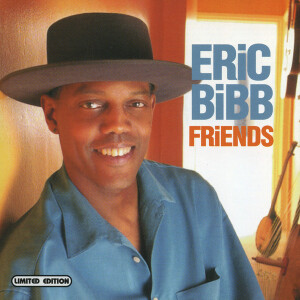 When I was a young man, before I reached my advanced years, nobody was singing the blues except for Englishmen. The old blues singers were in their dotage, and the younger black musicians avoided the blues like the plague. Then Taj Mahal came along and embraced the blues tradition, along with all the other traditions his roots led him to. In recent years a growing number of people have followed Taj on this path. Eric Bibb, whose father Leon was a highly regarded folk singer, blends blues, gospel, folk and country in a tasty gumbo in a healthy portion on this most recent CD.
When I was a young man, before I reached my advanced years, nobody was singing the blues except for Englishmen. The old blues singers were in their dotage, and the younger black musicians avoided the blues like the plague. Then Taj Mahal came along and embraced the blues tradition, along with all the other traditions his roots led him to. In recent years a growing number of people have followed Taj on this path. Eric Bibb, whose father Leon was a highly regarded folk singer, blends blues, gospel, folk and country in a tasty gumbo in a healthy portion on this most recent CD.
As you might guess from the title, it’s one of those Friends albums, wherein the artist is joined by a variety of associates for a stroll down memory lane or a career-spanning retrospective. Bibb’s album features more than a dozen guests, but the music is essentially the stuff of Bibb’s ouevre, with extra frosting.
Guy Davis provides 12-string slide and harmonica on the folk-gospel “99 1/2 Won’t Do,” which starts things off. It basically sets the parameters for what will follow: cleanly recorded, well-played bluesy music for suburban blues fans. In his notes Bibb admits, “both of us (he and Davis) grew up in the suburbs of New York City, though our musical souls are in the Southern regions of rural America.” Well, me too. But that doesn’t make MY blues any more authentic. These fellows hit all the right notes, and they sound good, but there’s an element of funk missing.
Charlie Musselwhite adds some sizzling harp to “Six O’Clock Blues” which gets a bit closer to the Delta. Ruthie Foster helps out on “For You,” a strong duet, done in one take! And Taj Mahal’s duet on “Goin’ Down Slow” is nearer the mark. Mamadou Diabate’s African kora playing on Taj’s “Lovin’ In My Baby’s Eyes” is beautiful, and Bibb’s vocals are husky and strong, but it doesn’t sound African. Is there anything wrong with that? Probably not, as long as you accept the fact that this is what it is, suburban blues for suburban listeners.
Guy Clark is one of this listener’s favorite song-writers. And “The Cape” is one of Clark’s best songs. Bibb does a solid if mellow rendition of it here, accompanied by Martin Simpson on slide and fingerstyle guitar. Excellent. Other guests include Odetta, whose powerful vocals (even when she’s toned WAY down) leave Bibb’s throaty voice in the dust; Harry Manx playing his mohan veena on “Needed Time;” Michael Jerome Browne, Byron Myhre, Kristina Olsen and Jerry Yester. That’s right, Jerry Yester! Where’s he been? He plays piano on the Leonard Cohen song “Dance Me To The End of Love.” The awesome Led Ka’apana adds his electric ukulele to “Cowgirl Queen,” (man, can that guy play!) and Taj Mahal and Malian guitarist Djelimady Tounkara join Bibb for a medley “Kulanjan/Sebastian’s Tune.”
This is a great-sounding, guitar-filled extravaganza. You can’t fault the musicianship, and the feel is friendly, with each player coaxing the best out of the other … it just misses on the funk scale. You aren’t going to be stomping your feet to this one, but you could learn a thing or two about traditions, relaxed singing and guitar picking.
(Manhattan Records, 2004)
